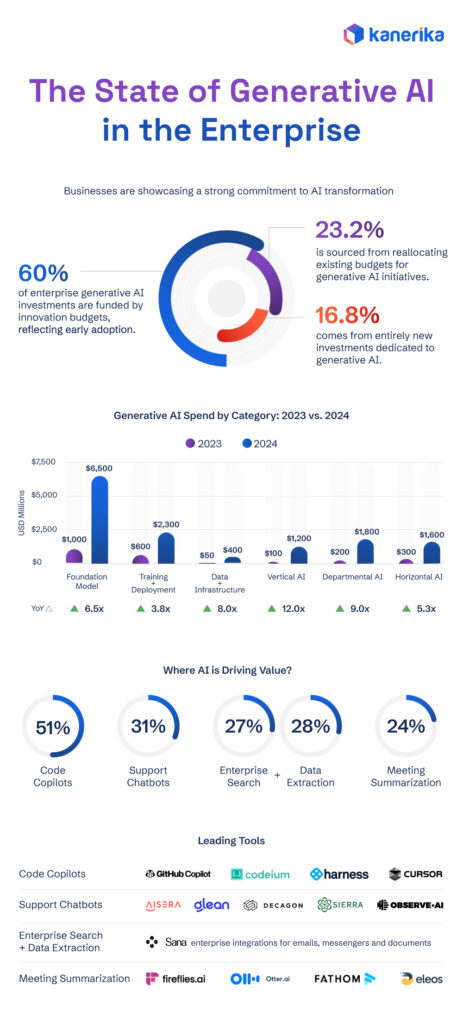Nike reduced its product development time from weeks to hours using artificial intelligence. Through the A.I.R. project, Nike has accelerated its design and prototyping processes, reducing development time from weeks to hours. While this transformation sounds impressive, it didn’t happen overnight – and it certainly didn’t happen without expert guidance.
78 percent of respondents say their organizations regularly use gen AI in at least one business function, up from 72 percent in 2024, according to McKinsey’s latest research. Yet here’s what most business leaders discover: having the technology and knowing how to use it strategically are two different challenges entirely.
Most companies struggle with the same questions: Which AI solutions actually move the needle? How do you integrate new technology without disrupting existing operations? What’s the real return on investment, and how quickly can you see results?
This is where generative AI consulting becomes essential. The right consulting partner doesn’t just implement technology – they help you identify opportunities, avoid costly mistakes, and build sustainable competitive advantages. Let’s explore which firms can help transform your business operations and why choosing the right partner matters more than you might think.
Upgrade From Tableau To Power BI!
Kanerika handles report mapping through simple structured migration tasks.
What is Generative AI Consulting?
Generative AI consulting is a specialized service where experts help businesses understand, implement, and optimize AI technologies that can create new content, code, designs, or solutions. Think of it as having a guide who helps companies navigate the complex world of AI tools like ChatGPT, image generators, or code assistants.
Initially, this field emerged around 2022-2023 when generative AI exploded into mainstream business consciousness. Early consultants focused primarily on basic implementation and workflow integration. However, the field has rapidly matured to encompass strategic planning, custom model development, ethical AI governance, and ROI optimization.
Today’s generative AI consultants address sophisticated challenges like data privacy, model fine-tuning, enterprise-scale deployment, and competitive differentiation. They’ve evolved from simple technology introducers to strategic partners who help organizations transform their operations, enhance creativity, and maintain competitive advantages in an AI-driven marketplace.
Why Your Business Needs Generative AI Consulting
1. Accelerated Time-to-Market
Expert consultants streamline implementation, reducing months-long projects to weeks. They leverage proven frameworks and avoid common pitfalls. For example, Coca-Cola used AI-driven marketing tools to speed up campaign rollouts with real-time creative generation.
- Fast-track deployment with pre-built solutions and templates
- Eliminate trial-and-error phases through expert guidance
- Accelerate team training and adoption processes
2. Strategic Alignment
Consultants ensure AI initiatives directly support business objectives. They map technology capabilities to specific organizational goals.
- Align AI investments with revenue generation opportunities
- Prioritize use cases based on maximum business impact
- Develop comprehensive AI roadmaps for sustainable growth
3. Risk Mitigation
Professional guidance helps avoid costly mistakes and compliance issues. Consultants identify potential pitfalls before they become problems.
- Navigate data privacy and security requirements
- Ensure ethical AI implementation and bias prevention
- Establish governance frameworks for responsible AI use
4. Cost Optimization
Consultants prevent expensive missteps and optimize resource allocation. They ensure budget efficiency throughout the implementation process.
- Avoid unnecessary tool investments through proper evaluation
- Optimize licensing and infrastructure costs
- Maximize ROI through strategic implementation priorities
5. Scalability Planning
Expert consultants design solutions that grow with your business. They architect systems for long-term expansion and evolution.
- Build flexible infrastructure for future AI initiatives
- Plan for increasing data volumes and user demands
- Design modular systems for easy updates and enhancements
6. Change Management
Consultants facilitate smooth organizational transitions and user adoption. They address resistance and ensure successful integration.
- Develop comprehensive training programs for all stakeholders
- Create communication strategies for AI adoption
- Establish feedback loops for continuous improvement
7. Technical Expertise
Access specialized knowledge without long-term hiring commitments. Consultants bring deep technical skills and industry experience.
- Leverage cutting-edge AI techniques and best practices
- Benefit from cross-industry insights and proven methodologies
- Access specialized skills for complex implementation challenges
8. Vendor Management
Consultants navigate the complex AI vendor landscape effectively. They provide objective evaluation and negotiation support.
- Evaluate and select appropriate AI platforms and tools
- Negotiate favorable terms and licensing agreements
- Manage multiple vendor relationships and integrations
9. Performance Monitoring
Establish robust measurement systems to track AI initiative success. Consultants implement comprehensive analytics and reporting frameworks.
- Set up key performance indicators and success metrics
- Create dashboards for real-time performance tracking
- Develop continuous improvement processes
10. Innovation Acceleration
Consultants introduce cutting-edge approaches and emerging technologies. They help organizations stay ahead of competitive curves.
- Explore advanced AI capabilities and emerging trends
- Pilot innovative solutions and proof-of-concept projects
- Foster innovation culture and experimentation mindset
Partner with Kanerika to Modernize Your Enterprise Operations with High-Impact Data & AI Solutions
Types of Generative AI Consulting Services: Which One Do You Need?
Not every business needs the same kind of support. Generative AI consulting typically falls into two key areas: Strategic and Implementation. Here’s what each one offers—and how to know which fits your needs.
1. Strategic Consulting Services
These services help you figure out the “why,” “where,” and “how” of using generative AI in your business.
What it includes:
- Assessing AI readiness across teams and systems
- Identifying business areas where generative AI can add real value
- Building a roadmap with priorities, timelines, and budget estimates
- Recommending the right platforms and vendors
- Defining risk, governance, and compliance plans
Best for:
- Companies just starting with AI
- Leaders unsure where AI fits in their business
- Teams needing a clear plan before building anything

2. Implementation Services
These services focus on building, testing, and launching generative AI tools that are customized to your business.
What it includes:
- Prototyping AI tools (e.g., chatbots, content generators, RAG systems)
- Integrating models into your current software and workflows
- Data engineering and model fine-tuning
- Infrastructure setup (e.g., cloud, GPU, APIs)
- Monitoring, feedback loops, and ongoing model optimization
Best for:
- Teams with a strategy in place, ready to build
- Businesses looking to automate or scale specific processes
- Firms needing expert support to launch faster and avoid mistakes
Partner with Kanerika to Modernize Your Enterprise Operations with High-Impact Data & AI Solutions
Top 17 Generative AI Consulting Companies in the USA: Your 2026 Vendor Guide
1. Kanerika
Kanerika is a global consulting firm specializing in AI, data analytics, and digital transformation services with over 220 employees across offices in Austin, TX and India. The company provides comprehensive AI/ML solutions, cloud migration, and automation services. As a key partner of Microsoft, AWS and Informatica, Kanerika’s team of skilled professionals leverages its expertise to help businesses unlock their full potential and drive innovation.
Founded: 2015
Major Locations: USA, India, Singapore, Argentina
Key Partnerships: Microsoft, Informatica, Databricks
Reputed Clients: Sony, Volkswagen, Kroger, Dr. Reddy’s
Other Services: Data analytics, RPA, Data Governance & Migration
2. Infosys
Founded in 1981 and based in Bengaluru, Infosys is one of India’s most recognized IT consulting firms and a major global player in AI and automation services. With a global workforce of over 300,000, the company offers applied AI solutions through platforms like Infosys Nia. They provide comprehensive generative AI consulting, implementation, and support services across industries.
Founded: 1981
Major Locations: India (Bengaluru HQ), USA (New York, Dallas), Europe (London, Paris), APAC centers
Key Partnerships: NVIDIA, Microsoft Azure, AWS, Databricks
Reputed Clients: Citigroup, Telstra, Pfizer, HSBC, Walmart
Other Services: ERP (SAP/Oracle), cloud migration, enterprise security
3. Space-O Technologies (AI)
Space-O Technologies (AI) specializes in custom AI development with over 500 completed projects across healthcare, finance, retail, and manufacturing sectors since 2010. The company provides end-to-end AI solutions from strategic planning and PoC validation through production deployment using GPT-4, Claude, and custom machine learning models. With expertise in consulting services for generative AI, Space-O’s accelerated development approach enables MVP delivery in 2-3 weeks while maintaining 99.9% uptime and enterprise-grade security standards.
Founded: 2010
Major Locations: USA (Arizona), Canada (Ontario), India (Ahmedabad)
Key Partnerships: OpenAI, AWS, Google Cloud, Microsoft Azure
Reputed Clients: Nike, McAfee, Saint-Gobain, Glovo
Other Services: NLP systems, computer vision, predictive analytics, intelligent automation
4. Boston Consulting Group (BCG)
Boston Consulting Group (BCG) is among the big consulting firms that have racked up hundreds of millions selling AI services. BCG’s AI @ Scale initiative helps clients extract value through AI-driven initiatives and create massive competitive advantages. They focus on strategic AI implementation and organizational transformation.
Founded: 1963
Major Locations: USA (Boston, NYC), EMEA (London, Berlin), APAC (Beijing, Sydney)
Key Partnerships: Microsoft, Google Cloud, NVIDIA, Anthropic
Reputed Clients: Coca-Cola, Shell, Pfizer, Samsung, Emirates
Other Services: Corporate strategy, digital transformation, sustainability
5. Accenture
Founded in 1989 by Andersen Consulting before rebranding in 2001, Accenture has grown into one of the world’s largest professional services firms with approximately 733,000 employees globally. Accenture is among the big consulting firms that have racked up hundreds of millions selling AI services. They offer comprehensive AI consulting, implementation, and managed services.
Founded: 1989
Major Locations: Ireland HQ, USA (Chicago, San Francisco), India (Mumbai, Pune), Europe & APAC offices
Key Partnerships: Microsoft, AWS, Google Cloud, Mistral AI
Reputed Clients: Unilever, JPMorgan Chase, Airbus, BMW, P&G
Other Services: Management consulting, cybersecurity, hybrid cloud services
6. PwC
PwC US has already started a comprehensive AI skills training program and offers extensive AI consulting services. They provide strategic AI advisory, implementation, and risk management services to help organizations adopt AI responsibly and effectively.
Founded: 1998 (merger)
Major Locations: USA (New York, Chicago), UK (London), India (Mumbai), Australia (Sydney)
Key Partnerships: Microsoft, Meta, OpenAI
Reputed Clients: HSBC, Boeing, Nestlé, Verizon, Emirates Airline
Other Services: Audit, tax advisory, digital assurance
7. McKinsey & Company
McKinsey’s QuantumBlack Labs is where technologists, designers, and product managers build cutting-edge tools and assets that reduce risk and accelerate impact at every stage of the AI transformation journey. McKinsey is among the big consulting firms that have racked up hundreds of millions selling AI services.
Founded: 1926
Major Locations: USA (Chicago, NYC), UK (London), EMEA (Düsseldorf, Dubai), APAC (Hong Kong, Mumbai)
Key Partnerships: Microsoft, Google, NVIDIA, Anthropic
Reputed Clients: GE, Walmart, Novartis, Sony, BP
Other Services: Strategy & operations, supply chain, industry insights
8. IBM
IBM is among the big consulting firms that have racked up hundreds of millions selling AI services. It offers comprehensive AI consulting through IBM Consulting, leveraging their Watson AI platform and extensive technology expertise for enterprise AI implementations.
Founded: 1911
Major Locations: USA (Armonk HQ, Raleigh), UK (London), India (Bengaluru), EMEA & APAC presence
Key Partnerships: AWS, Adobe, Oracle
Reputed Clients: Bank of America, Vodafone, Maersk, Lufthansa, Lenovo
Other Services: Cloud migration, cybersecurity, application modernization
Move From Informatica to Talend!
Kanerika keeps your workflow migration running smooth.
9. Capgemini
Headquartered in Paris, France, Capgemini prides itself in driving innovation to improve how the world works and lives. Their multifaceted approach focuses on enabling businesses to seize every opportunity in the ever-evolving world of cloud, digital, and platforms.
Founded: 1967
Major Locations: France (Paris HQ), India (Chennai, Pune), USA (Boston), London, Sydney
Key Partnerships: Google Cloud, SAP, AWS
Reputed Clients: Coca-Cola, Daimler, Nestlé, L’Oréal, Siemens
Other Services: Cloud transformation, ERP, cybersecurity
10. Scale AI
Scale AI specializes in AI data infrastructure and provides consulting services for AI model development and deployment. They focus on data labeling, model training, and AI operations for enterprises looking to scale their AI initiatives.
Founded: 2016
Major Locations: USA (San Francisco, New York), Canada (Toronto), EMEA hub
Key Partnerships: OpenAI, Microsoft, ElevenLabs
Reputed Clients: TIME, Waymo, OpenStreetMap, US Department of Defense
Other Services: Data labeling, ML data pipelines
11. Cognizant
Cognizant provides comprehensive AI consulting services including strategy, implementation, and managed services. They help enterprises transform their operations through AI-powered solutions and digital transformation initiatives.
Founded: 1994
Major Locations: USA (Teaneck HQ, Atlanta), India (Chennai, Hyderabad), UK (London), APAC centers
Key Partnerships: Microsoft, AWS, Google Cloud
Reputed Clients: Merck, T-Mobile, Allianz, Lloyds, Delta Airlines
Other Services: IT services, digital engineering, process automation
12. The Hackett Group
The Hackett Group provides AI consulting focused on business transformation and operational excellence. They specialize in helping organizations leverage AI for finance, HR, and operational process improvements.
Founded: 1991
Major Locations: USA (Tampa HQ), UK (London), Europe & APAC
Key Partnerships: N/A (independent advisor)
Reputed Clients: Renault, HSBC, Boeing, Microsoft, Nestlé
Other Services: Benchmarking, performance management, best practices advisory
13. InData Labs
InData Labs provides AI consulting and development services with focus on custom AI solutions, machine learning model development, and AI strategy consulting for enterprises across various industries.
Founded: 2014
Major Locations: USA (Boston HQ), Lithuania, Ukraine, other EU offices
Key Partnerships: AWS, Microsoft Azure, Snowflake
Reputed Clients: Payoneer, Société Générale, Adidas, Biontech
Other Services: Data science, analytics, business intelligence
14. ITRex Group
ITRex Group offers AI consulting services including strategy development, custom AI solution development, and implementation support. They specialize in healthcare, fintech, and enterprise AI applications.
Founded: 2009
Major Locations: USA (NYC, Chicago), UK (London), CIS offices
Key Partnerships: AWS, Microsoft, Google Cloud
Reputed Clients: Danone, Honeywell, T-Mobile, Scalefocus
Other Services: IoT solutions, mobile & web development, digital engineering
15. Deeper Insights
Deeper Insights provides AI consulting and data science services with focus on advanced analytics, machine learning, and AI strategy for enterprises looking to leverage their data assets effectively.
Founded: circa 2016
Major Locations: UK (London HQ), USA (New York)
Key Partnerships: N/A (independent specialist)
Reputed Clients: Aviva, Legal & General, Zurich Insurance, Lloyds Bank, Direct Line
Other Services: CRM implementation, BI reporting
16. Addepto
Addepto provides AI consulting services including strategy development, custom AI solution development, and implementation support with focus on computer vision, NLP, and machine learning applications.
Founded: 2014
Major Locations: Poland (Warsaw HQ), USA (Chicago), UK (London)
Key Partnerships: AWS, Microsoft Azure, Google Cloud
Reputed Clients: Skyscanner, DB Schenker, Allegro, Toyota, L’Oréal
Other Services: Data engineering, ML Ops, visual analytics
17. Master of Code
Master of Code Global is a leader in AI consulting and development, helping brands like Tom Ford, Electronic Arts, and T-Mobile achieve measurable results with generative AI, conversational AI, and enterprise automation solutions.
Founded: 2004
Major Locations: Canada HQ, USA (California, New York), Europe (Ukraine, Portugal), global delivery presence
Key Partnerships: Google Cloud, AWS, Salesforce, Microsoft
Reputed Clients: Tom Ford, T-Mobile, Electronic Arts, Golden State Warriors, Burberry, Jo Malone, La Mer
Other Services: Web & mobile development, SaaS, CRM, blockchain, voice AI, custom enterprise software
Transform Your Business with Impactful Generative AI Solutions!
Partner with Kanerika for Expert AI implementation Services
What Does Generative AI Consulting Cover?
Generative AI consulting isn’t just about launching tools. It’s about building a foundation, making smart decisions, and scaling AI responsibly. Here’s what a complete consulting engagement typically includes:
1. Strategy & Readiness Assessment
This is where consultants evaluate whether your business is ready for generative AI—technically, culturally, and financially. It helps avoid wasted investment and sets a clear direction.
- Review current data infrastructure and systems
- Assess team skills, budget, and process maturity
- Identify key risks and organizational gaps
2. AI Use-Case Ideation
Consultants work with you to find high-impact, low-risk areas where generative AI can bring real results. This stage helps prioritize what to build first.
- Identify repetitive or manual-heavy tasks
- Map AI value to customer and business outcomes
- Score use-cases by feasibility and ROI potential
3. Architecture & Prototype Development
Once the idea is chosen, consultants help design how the AI system will work and build a quick prototype to test the concept.
- Design technical architecture (models, data flow, APIs)
- Build MVP or proof of concept for stakeholder feedback
- Ensure integration with existing tools or platforms
4. Model Training & Tuning
This involves customizing the AI model for your needs—training it on your data and refining it for accuracy and relevance.
- Fine-tune large language models using internal datasets
- Optimize output quality, tone, and relevance
- Test different model sizes and configurations
5. Governance, Ethics, Compliance
Consultants make sure your AI use follows regulations, protects data, and behaves responsibly—even under pressure.
- Set policies for fairness, bias, and transparency
- Ensure GDPR, HIPAA, or local data compliance
- Build audit trails and model usage tracking
6. Deployment, Training & Scale
Launching AI tools into your business takes planning. This step ensures the rollout doesn’t disrupt workflows and that your team is ready to use it.
- Deploy AI in a secure and scalable environment
- Train staff on AI interaction and oversight
- Set up support, monitoring, and feedback loops
7. CoE Creation (Center of Excellence)
For long-term AI success, consultants help set up a team and process structure that manages AI across departments.
- Build a cross-functional Gen AI leadership team
- Define AI ownership, KPIs, and review cycles
- Share standards, use-case templates, and best practices
Generative AI for Retail: Real-World Use Cases You Need to Know
Explore how generative AI is transforming the retail industry with real-world use cases that enhance customer experiences, optimize operations, and drive growth!
The 10-Point Evaluation Checklist for Choosing a Generative AI Consultant
1. Proven Track Record
Look for consultants who’ve delivered real results for real clients. Case studies, client logos, and testimonials can tell you if they’ve done this before—and if they’re worth trusting with your business.
2. Technical Capabilities
Make sure they understand the tools, platforms, and models inside out. They should know how to fine-tune, integrate, and scale AI—not just talk about it in theory.
3. Industry Expertise
Choose someone who knows your industry. Whether it’s healthcare, retail, or finance, domain knowledge helps them recommend smarter use cases and avoid costly mistakes.
4. Methodology and Process
A solid step-by-step process shows they’re organized and experienced. Ask how they go from idea to deployment—and if they’ve built successful AI pipelines before.
5. Partnership Approach
You want a consultant who works with your team, not just for you. Look for open communication, co-building, and a mindset focused on collaboration.
6. Support and Maintenance
AI tools need updates and monitoring. Check if they offer support after launch—like retraining models, fixing bugs, or helping teams adapt over time.
7. Security and Compliance
Handling your data comes with big responsibilities. Ensure they follow strong data protection standards and know the rules like GDPR, HIPAA, or industry-specific laws.
8. Pricing and Value
Cheapest isn’t always best. Look for transparent pricing that matches your budget—and delivers value, not just a long bill. Ask for clear outcomes and scope.
9. Innovation and Future-Proofing
Technology moves fast. The right consultant should keep up with new tools, platforms, and model updates—so you don’t get stuck with something outdated next year.
10. Cultural Fit
Skills matter, but so does working style. Pick a consultant whose approach matches your company’s pace, values, and communication preferences—it makes every step smoother.
Enhance Your Enterprise Workflows with Generative AI Solutions!
Partner with Kanerika for Expert AI implementation Services
FAQs
What does a generative AI consultant do?
Generative AI consultants help businesses harness the power of AI tools like ChatGPT and DALL-E. They bridge the gap between complex technology and business needs, designing and implementing AI solutions tailored to specific goals. Essentially, they’re strategic advisors who unlock the creative and productive potential of generative AI for their clients. This includes everything from identifying use cases to ensuring ethical and responsible implementation.
What company is leading in generative AI?
There’s no single “leader” in generative AI; it’s a rapidly evolving field. Companies like Google, OpenAI, and Microsoft are major players, each excelling in different areas (e.g., models, infrastructure, applications). Ultimately, leadership depends on the specific application and metric used (research publications, market share, etc.). The landscape is incredibly dynamic.
How big is the gen AI consulting market?
Pinpointing the exact size of the generative AI consulting market is tricky, as it’s rapidly evolving and data is still emerging. We’re seeing explosive growth, however, driven by businesses needing help integrating this powerful technology. Estimates vary widely, but it’s safe to say it’s a multi-billion dollar market currently experiencing hyper-growth. Think of it as a rapidly expanding gold rush, with significant future potential.
Is NLP part of generative AI?
No, NLP is a *subset* of AI, focusing specifically on human language understanding and generation. Generative AI is a broader category encompassing various techniques, including – but not limited to – NLP. Think of it like this: all NLP is generative AI (if it’s generating text), but not all generative AI is NLP (it could generate images or music).
What is the most famous generative AI?
There isn’t one single “most famous” generative AI, as fame depends on the audience and application. However, models like DALL-E 2 (for image generation) and ChatGPT (for text) are consistently top contenders, renowned for their accessibility and impressive capabilities. Their popularity stems from bridging the gap between complex AI and everyday users.
What is the future of AI Consulting?
AI consulting’s future is bright but nuanced. It will increasingly involve specialized expertise beyond basic implementation, focusing on ethical considerations, data strategy, and integrating AI seamlessly into existing business processes. The demand will be for consultants who can navigate the complex interplay of technology, business strategy, and societal impact. Ultimately, success hinges on demonstrating tangible ROI and addressing client’s unique needs rather than simply offering generic AI solutions.
Is generative AI the future?
Generative AI isn’t simply “the future”—it’s a powerful tool rapidly reshaping our present. Its ability to create novel content across various mediums is already transforming industries. However, ethical considerations and potential biases are crucial factors determining its long-term impact, making its future trajectory complex and not fully predictable. It’s more accurate to say it’s a transformative force, not a singular, inevitable future.
What is the role of AI Consultant?
AI consultants bridge the gap between businesses and artificial intelligence. They analyze a company’s needs, identify how AI can solve problems or create opportunities, and then design, implement, and manage AI solutions. Essentially, they’re AI strategists and project managers, ensuring successful AI adoption. They also provide ongoing support and training.
What is the difference between generative AI and AI?
Generative AI is a *subset* of artificial intelligence. While all generative AI is AI, not all AI is generative. The key difference is that generative AI *creates* new content (text, images, code, etc.), whereas AI, broadly, encompasses any system that mimics human intelligence, including tasks like analysis, prediction, or decision-making, without necessarily generating novel outputs. Think of it as “AI that makes things” vs. “AI that does things.”
What is the main goal of generative AI?
Generative AI’s core aim is to create new content – text, images, music, code – that’s similar to what it’s been trained on, but not a direct copy. It essentially learns patterns and then uses that knowledge to produce something original. This contrasts with traditional AI that focuses primarily on analysis or prediction. Ultimately, it aims to augment human creativity and efficiency.
How is AI used in consulting?
AI boosts consulting efficiency and effectiveness in several ways. It analyzes massive datasets to identify trends and insights humans might miss, leading to sharper, data-driven recommendations. AI also automates routine tasks like data cleaning and report generation, freeing consultants to focus on strategic thinking and client interaction. Ultimately, this blend of human expertise and AI power delivers faster, more accurate, and more valuable solutions for clients.
Why is generative AI so popular?
Generative AI’s popularity stems from its ability to create novel content, automating tasks previously requiring human creativity. This unlocks exciting possibilities across various fields, from art and marketing to software development and scientific research. Essentially, it offers unprecedented efficiency and opens doors to entirely new forms of expression and innovation. The ease of access to powerful models further fuels its widespread adoption.





